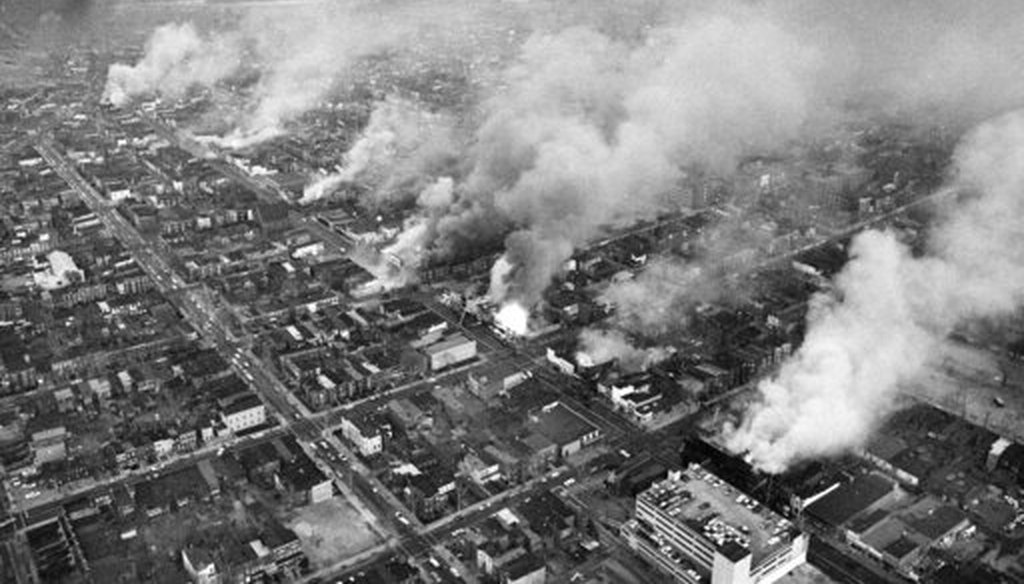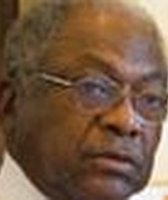Get PolitiFact in your inbox.

In this April 5, 1968 file photo, buildings burn along H Street in the northeast section of Washington, set afire during a day of demonstrations and rioting in reaction to the assassination of Dr. Martin Luther King Jr. (AP)
If Your Time is short
-
President Johnson signed the Civil Rights Act in 1964.
-
Martin Luther King Jr. was assassinated April 4, 1968, sparking riots in cities nationwide.
-
A week later Johnson signed the Fair Housing Act, which is sometimes referred to as the Civil Rights Act of 1968.
-
In August of 1968, Johnson signed the Housing and Urban Development Act.
The outpouring of Americans demanding an end to police brutality and racism after the death of George Floyd recalls the turbulent 1960s fight for civil rights.
Charlamagne tha God, host of The Breakfast Club radio show, said he hopes more change will come from the 2020 demonstrations.
"Things will change after this moment," he told Michel Martin on CNN June 3. "I think about Martin Luther King Jr. after he got assassinated. I think it was like six days of riots in like 114 cities, 40-plus million dollars worth of damage all throughout the country, and Lyndon B. Johnson signed that goddamn Civil Rights Act of 1964. Something like that is going to come from this."
Charlamagne, whose given name is Lenard McKelvey, made a similar claim in an interview with Stephen Colbert. But his history is inaccurate: The 1964 civil rights law happened four years before King was killed.
When a Texas resident tweeted at him about getting it wrong, Charlamagne replied that he meant to single out a 1968 housing law that followed 10 days of widespread riots after King’s assassination.
That isn’t the only example of hard-fought civil rights legislation achieved after tragedy or upheaval in that era. With the new focus on national demonstrations, we wanted to review the connection the riots that Charlamagne described after King’s death and the influence it had on civil rights legislation. Here’s what we found when we looked back at what happened during the 1960s.
The Civil Rights Act of 1964 was signed after nonviolent protests
Johnson signed the Civil Rights Act that banned segregation in public spaces in July 1964 following years of nonviolent protests and violent attacks on black Americans. It followed the bombing of the church in Birmingham in 1963 and the March on Washington in 1963, as well as years-long fights to end school segregation.
Black Americans still faced discrimination as they tried to vote. On March 7, 1965, police savagely beat hundreds of peaceful protesters as they marched for voting rights in Selma, Ala., a day memorialized as Bloody Sunday.
Experts trace the passage of the Voting Rights Act in August 1965 to Bloody Sunday, said Andra Gillespie, a political scientist at Emory University.
There were riots in this period before King’s death. Charlamagne’s mention of 114 cities matches the number of riots in 1967 offered in the book "People and Politics in Urban America."
Housing laws followed King’s assassination
King’s assassination on April 4, 1968, set off 10 days of riots in which 43 people died and 27,000 were arrested. Author Peter Levy called it "the greatest wave of social unrest since the Civil War" in his book titled "The Great Uprising: Race Riots in Urban America in the 1960s.".
Clay Risen, author of "A Nation in Flames: America in the Wake of the King Assassination," estimated the damage at $65 million. The uprisings — taking place in between 125 to 196 cities — ended after Johnson deployed 58,000 National Guardsmen and Army troops to join state and local law enforcement.
At the same time, Johnson urged Congress to pick up the stalled Federal Fair Housing Act, also known as the Civil Rights Act of 1968.
King had pushed for fair housing practices, but some lawmakers resisted action at a time when a majority of Americans opposed substantial numbers of black people moving into their neighborhoods.
Johnson proposed legislation to ban segregation for renters and prospective home buyers in 1966. It passed the House in August 1967 and made it through the Senate with amendments in March 1968, the same month that Johnson announced he would not seek re-election. But then it entered legislative limbo in the House Rules Committee "which had long acted as a brake on civil rights initiatives," according to a history compiled by the House.
The day after King’s assassination, Johnson urged Congress to pass the legislation as soon as possible. It did, and Johnson signed the law on April 11, a week after King’s assassination.
"With people angry in the streets, it made sense for Congress to pass legislation aimed at showing continued progress on the racial front," said Lopez D. Matthews Jr., digital librarian at Howard University.
While Johnson already supported the housing law, the explosion of anger following King’s assassination had an impact on him, said Robert Dallek, a historian and author of the book "Flawed Giant: Lyndon Johnson and his Times."
"Johnson was sensitive to that. I think it helped him get the Fair Housing Law of 1968 passed through Congress," Dallek said.
Historian Doris Kearns Goodwin, author of "Lyndon Johnson and the American Dream," said Johnson wrote in his memoir about meeting with civil rights leaders the morning after King’s death and spoke about seizing the opportunity to pass a housing law. While advisers suggested an executive order, Johnson wanted the force of congressional approval.
Charlamagne was referring to a separate piece of legislation, the Housing and Urban Development Act of 1968. Johnson signed it into law in August 1968. That legislation set a goal to build 26 million housing units, of which 6 million would be for low- or moderate-income housing.
The HUD legislation was a continuation of the earlier legislation. King’s death and the riots "gave Johnson an additional boost to put that major housing law across," Dallek said.
A spokeswoman for Charlamagne sent us an article by Shelter Force, a community development organization that supports low-income communities, which stated that this was the more important law signed by Johnson about housing that year. The act included homeownership studies, rental assistance and an increase in public housing construction.
PolitiFact researcher Caryn Baird contributed to this fact-check.
Our Sources
CNN, Transcript and video of interview with Charlamagne Tha God, June 3, 2020
Stephen Colbert, Charlamagne Tha God On Systemic Racism And How Reparations Can Lead To Economic Justice, June 3, 2020
Charlamagne Tha God, Tweet, June 4, 2020
University of Virginia, Question and Answer: Historian Compares today’s protests to civil rights movement of 50s and 60s, June 3, 2020
History.com, President Johnson signs Civil Rights Act, July 2, 1964
U.S. House, The Fair Housing Act of 1968, April 1968
President Lyndon Johnson, Remarks Upon Signing the Housing and Urban Development Act of 1968. Aug. 1, 1968
Shelter Force, The Most Important Housing Law Passed in 1968 Wasn’t the Fair Housing Act, Sept. 5, 2018
Clay Risen in The Guardian, The legacy of the 1968 riots, April 4, 2008
President Lyndon Johnson, Letter to House Speaker John W. McCormack, April 5, 1968
U.S. Department of Housing and Urban Development, HUD history
Robert and Mary Kweit People and Politics in Urban America, 1990
Housing and Urban Development Act of 1968
Peter Levy, The Great Uprising: Race Riots in Urban America in the 1960s, 2018
New York Times, ‘Looting’ Comment From Trump Dates Back to Racial Unrest of the 1960s, May 29, 2020
Boston.com, Events That Led to the Civil Rights Act of 1964, July 2, 2014
Flawed Giant: Lyndon Johnson and His Times, 1961-1973 - Page 533
Former Sen. Charles McCurdy "Mac" Mathias Jr., Fair Housing Legislation: Not an easy row to hoe
LBJ presidential library, Seeing Is Believing - The Enduring Legacy of Lyndon Johnson, May 19, 2008
Washington Post, The Fair Housing Act was languishing in Congress. Then Martin Luther King Jr. was killed. April 11, 2018
William J. Collins and Robert A. Margo, The Labor Market Effects of the 1960s riots, 2004
New York Times, Charlamagne Tha God Puts His Straight Talk in a Book, April 17, 2017
Peniel E. Joseph op-ed in the Washington Post, What would Martin Luther King Jr. say about the current civil unrest? June 1, 2020
GQ, Why Violent Protests Work, June 2, 2020
Email interview, Walter C. Rucker, Emory University historian, June 4, 2020
Email interview, Fabio Guillermo Rojas, Indiana University sociologist, June 4, 2020
Telephone interview, Lopez Matthews Jr., Howard University digital librarian and historian, June 4, 2020
Email interview, Kevin Kruse, Princeton University historian, June 4, 2020
Email interview, Omar Wasow, Princeton University political scientist, June 4, 2020
Email interview, Andra Gillespie, Emory University political scientist, June 4, 2020
Email interview, Gregg Carter, Bryant University sociologist, June 4, 2020
Email interview, Peniel E. Joseph, University of Texas historian and founding director, Center for the Study of Race and Democracy, June 4, 2020
Email interview, Marvet Britto, spokeswoman for Charlamagne Tha God, June 4, 2020
Email interview, Peter Levy, York College history professor and author of The Great Uprising: Race Riots in urban America in the 1960s, June 5, 2020
Telephone interview, Robert Dallek, retired historian and author of Flawed Giant: Lyndon Johnson in his times, June 5, 2020












































